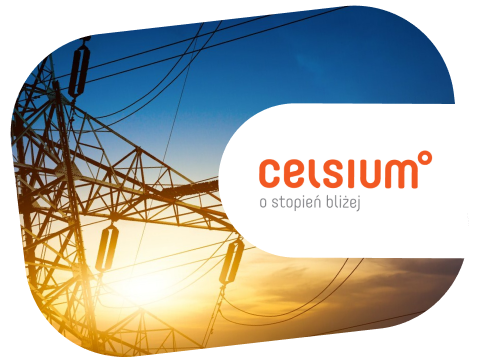Celsium Sp. z o.o. is a company belonging to the E.ON Energy Infrastructure Solutions Polska group, with over 40 years of experience, specializing in providing thermal energy to individual and industrial customers. The company operates in five cities in Poland, engaging in pro-ecological initiatives and air quality monitoring.

Project objective:
The project was initiated in response to the lack of a consistent analytical environment enabling the ongoing balancing of data from heat meters in relation to weather conditions. The dispersion of data across multiple telemetry systems and the lack of a single source of truth for sales, production, and weather data resulted in long analysis times and limited the ability to respond quickly to irregularities and financial risks.
Scope of work
- Process analysis and data-driven strategy:
- Together with the client, we analyzed all activities of technical teams, billing processes, actual technical conditions related to heat meters, data collected by these meters and data related to the operation of heat sources.,
- We identified where employee activities and billing processes are not reflected in data creation and we developed algorithms how to prevent it
- Together with the client, we have developed a data-driven strategy that involves breaking down silos (i.e. collecting consumption data from meters, billing data, production data, current weather data and weather forecasts in one place), changing the granularity of data and the way they are used from a monthly cycle to a daily cycle.
- Building solutions implementing the planned strategy data warehouse on Google Cloud Platform (GCP):
- We designed a data warehouse based on the Google Cloud Platform (GCP), using primarily BiqQuery and serverless components at the interface with source systems and for orchestration purposes.
- Our team designed the data architecture, integrating various data sources, including telemetry, production, billing and analog data systems.
- We have developed automated ETL processes combining data from SCADA systems, meters and manual data (e.g. dispatcher reports)
- We have introduced new analytical processes, which allowed us to significantly shorten the data processing time and improve their quality thanks to the elimination of errors and automated information flow.
- We used data modeling that took into account the removal of anomalies, interpolation of gaps and combining tariff, metering and production data.
- Creating visualizations and business analytics:
- We have created management dashboards in Tableau, providing current information on the generated and consumed thermal power, sales results and the status of measuring devices. Within which:
- We have introduced a mechanism that constantly checks whether the data from the meters is current and reliable. This made it possible to quickly detect meters that stopped working or were sending incorrect readings. This allowed the company to respond faster to faults and reduce the risk of loss of revenue or unnecessary costs.
- We also analyzed data from previous years and corrected discrepancies between systems, which helped us better understand previous losses and plan corrective actions.
- Our experts have implemented mechanisms for monitoring heat losses and meter failures.
- We have implemented an algorithm for forecasting heat demand, developed internally by E.ON. Alterdata was responsible for creating data flows between the Celsium and E.ON systems and preparing dashboards visualizing the forecast results.
- We have created management dashboards in Tableau, providing current information on the generated and consumed thermal power, sales results and the status of measuring devices. Within which:
- Training and documentation:
- At the end, we trained the client's team in using new analytical tools and data processes.
- We have also developed detailed technical and operational documentation, which enables the client to independently manage the system.
- Algorithm optimization
After three years of intensive use of the platform, we started to rewrite and optimize the main data processing algorithms. This allowed us to significantly reduce the consumption of computing resources in the Google Cloud Platform.
This resulted in a four-fold reduction in operating costs related to maintaining the analytical system - without losing the quality of operation or functionality of the solution.

Results
Key results:
- Detection of meter failures within one day, whereas previously their identification took up to a month due to internal data collection processes. The data is verified every 8 hours, which allows for quick diagnosis and immediate service actions, minimizing the risk of loss of revenue.
- Ongoing balancing of heat supply and demand using production data and weather forecasts. Implementation of the heat demand forecast algorithm in the heating system. This enabled a more dynamic selection of operating heat sources and more detailed planning of their operation. As a result, the company optimized the costs of fuel burned.
- Shortening analytical processes from several months to just a few hours. Production and consumption data is now refreshed three times daily, giving management real-time visibility into key operating metrics and enabling faster, better-informed decisions.
- Generating financial savings of PLN 180,000. PLN per year by optimizing the operation of heat sources, reducing transmission losses and eliminating inefficiencies in production and distribution processes.
- Consolidation of data from various systems, which significantly improved the quality of analyzes and accuracy of operational decisions in technical and financial areas.
Business value:
- Democratization of data and finding "one truth" for reporting purposes - by making the same data available to a wide range of recipients - many managers have become aware of which elements of processes or infrastructure require special supervision. Internal communication within the company has become easier by providing one set of base data for further analysis.
- The basis for more advanced analyzes was created, including forecasting the demand for thermal energy, among others. based on weather forecasts for individual heat collection points.
Client feedback

 Customer opinion
Customer opinion
Alterdata helped us fully understand the potential of data in our company. Thanks to the implemented solutions, we can make business decisions based on detailed and easily accessible data. The performed analytics allow us to look deeper into the heart of our business and draw better conclusions. This approach has significantly increased the efficiency of our organization and brought a new quality to our daily work
Alterdata helped us fully understand the potential of data in our company. Thanks to the implemented solutions, we can make business decisions based on detailed and easily accessible data.

Summary
Celsium's digital transformation is an example of how data integration in one cloud allows for quick balancing of supply and demand and prediction of heat demand. Breaking down information silos and implementing a single source of truth enabled faster problem detection and minimized the risk of device downtime.
By optimizing processes in Google Cloud Platform, the company gained scalability, automation and savings. This is the foundation for further development towards a fully data-driven organization.
If your organization is facing the challenge of integrating data, improving operational efficiency, or transitioning to a data-driven management model, we are here to help.
👉 Contact us and let's talk about how we can support data-driven transformation in your company as well.






























